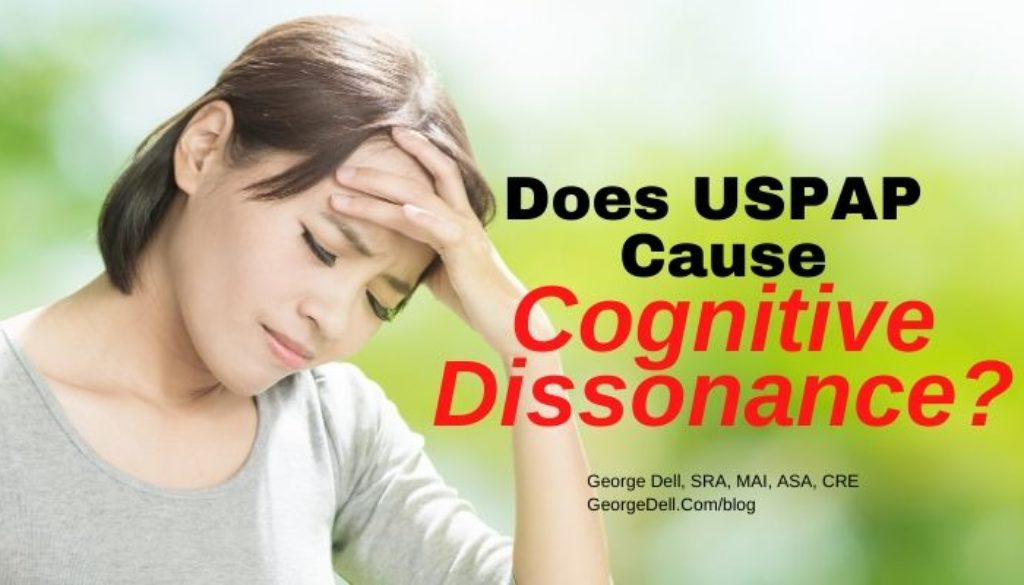Cognitive dissonance is the mental stress we feel when we’re confronted with conflicting beliefs and requirements. How could this possibly be a USPAP issue?
USPAP, (Uniform Standards of Professional Appraisal Practice) may cause psychological dissonance in appraisers – because the review standards and practice standards have different requirements!
For the appraiser, Standard 1-2(h) requires results to comply with the Scope of Work Rule. The test of acceptability is:
- Do what intended users expect; and
- Do what appraiser peers would do.
Simple. No Dissonance.
So, what about appraisal review methods? In Standard 3, the reviewer is to “develop an opinion as to the completeness, accuracy, adequacy, relevance, and reasonableness in the work under review.”
Each of these five criteria are wholly subjective. However, we can look at the elements:
Completeness – having everything needed. This must be in the context of the “context of the requirements applicable.” Credibility (worthy of belief) is always the test.
Accuracy is a bit trickier. Appraisal deals with numbers or opinions of numbers or estimates of numbers or categories. Simple. So, what is accuracy? Accuracy is the quality of being true, correct, or exact.
In order to form an opinion, to compare — a reviewer must know the true, correct, or exact number. Do reviewers have magical powers of true knowledge? Or do they have to form their own opinion –a number to compare to? And how close does the appraiser opinion have to be to the reviewer opinion – for it to be sufficiently close to be accurate?
Alternately, how far off does the appraiser opinion have to be from the reviewer secret true number?
Adequacy – sufficient for a particular purpose. Again, context is the issue. It appears that adequacy depends on completeness, and accuracy. “How close is close enough?” “How complete is adequate enough?” Many clients, especially in the world of collateral or litigation, only judge adequacy on the basis of making the deal or winning their case.
Relevance – “connected with the matter at hand” is a colloquial meaning. In the world of data, and analysis, it means the information is applicable to estimate the result. Some data is helpful, some is not. (GIGO – garbage in garbage out). Where is the line to determine “relevant”?
But there is another “relevant” relevant to appraisal. Does the result answer the question asked? (If we assume an unbiased result is truly wanted.) Again, we are faced with the problem that the reviewer must have their own opinion of what is relevant and what is not. Perplexing!
Reasonableness – finally! Let’s be reasonable. “Able to be reasoned with.” Alternately, this word might mean “within a reasonable range of my opinion.” Again, the “reviewer” must first have an opinion to test against for “reasonableness”!
So, what do clients expect? And what does everybody do?
Do that!

July 8, 2020 @ 9:10 am
Yes, trying to comply with USPAP can result in cognitive dissonance, which is why I comply with IVS (International Valuation Standards) instead. The best thing the TAF did was to incorporate IVS into its accepted standards and seat RICS, a Standards Setting organization, on its Board of Directors.
So, I am an IVS-y Leaguer who enjoys his TAF-fy.
July 11, 2020 @ 7:22 am
The variables of trying to be so generally acceptable and a “one size fits all” standard creates many clashing contradictions that can confuse even the most experienced appraisers. To have to tackle these variables on a daily basis, slowly over time, may create a set neural pathways in the brain that are so far away from reality, the appraiser is no longer able to be a fair judge of value from the common, inexperienced, uneducated, homeowner. The common buyer we’re also supposed to see value through the eyes of. (also) Since the root basics of real estate economics stems from Supply and demand, demand coming from the common buyer through arms length transactions.